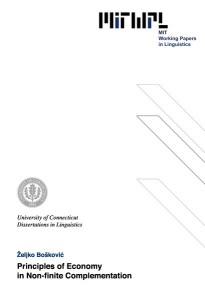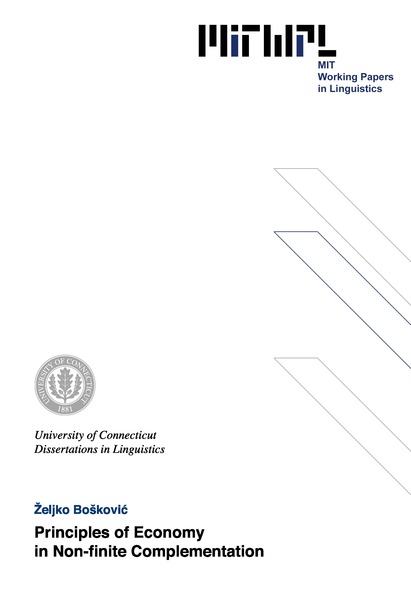Principles of Economy in Non-finite Complementation
Ž. Bošcović, 1995
Table of Contents
Introduction (1)
1.1. Economy and the Minimalist Program (1)
1.2. Outline of the thesis (5)
Selection and the Categorial Status of Infinitival Complements (9)
2.1. Introduction (9)
2.2. Infinitival complementation and c-selection (13)
2.2.1. Case-checking with ECM verbs (22)
2.2.2. Try-class verbs and Case-checking (24)
2.2.3. Case-checking with want-class verbs (26)
2.2.4. The categorical status of control infinitives (32)
2.2.4.1. Empty complementizers and the ECP (32)
2.2.4.2. Scrambling out of control infinitives (37)
2.3. Economy of Representations and the categorical status of clauses (41)
2.3.1. Null operator relatives and Economy of Representation (42)
2.3.2. Finite declarative complements and Economy of Representation (50)
2.3.2.1. Topicalization (52)
2.3.2.2. Wanna contraction (58)
2.4. Other recent analyses of infinitival complementation (64)
2.5. Conclusion (76)
Wager-class verbs and French propositional infinitivals (78)
3.1. Introduction (78)
3.2. Infinitival complementation and wager-class verbs: The Agentive Hypothesis (81)
3.2.1. Wh-extraction out of wager-class infinitivals (97)
3.3. Infinitival Complementation in French (101)
Existential Constructions, A-movement, and Infinitival Complementation (115)
4.1. Introduction (115)
4.2. Existential constructions and the Expletive Replacement Hypothesis (116)
4.3. Infinitival complementation and existential constructions (121)
4.3.1. Case assignment in existential constructions (121)
4.3.2. What motivates A-movement? (123)
4.3.3. Evidence for the affix hopping analysis (135)
4.3.3.1. The interpretation of the associate (135)
4.3.3.2. Antecedent-contained deletion and existential constructions (137)
4.3.3.3. Agreement with conjoined NPs in existential constructions (140)
4.3.4. It and expletive replacement (143)
4.3.5. Feature movement analyses of existential constructions (148)
4.3.6. Conclusion: expletive replacement (166)
4.4. More on Greed: ECM constructions (166)
4.4.1. Overt object shift in ECM constructions (169)
4.4.1.1. Quantifier float in infinitival complements (173)
4.4.1.2. Adverb placement in ECM constructions (177)
4.4.1.3. Coordination of ECM infinitives (182)
4.4.1.4. Pseudocleft constructions (185)
4.4.1.5. The Subject Condition effect (190)
4.4.2. Wh-movement out of wager-class and French propositional infinitivals (193)
4.5. A-movement and A-positions (204)
4.5.1. Greed, the EPP, and the Inverse Case Filter (204)
4.6. Conclusion (216)
Participle movement (218)
5.1. Introduction (218)
5.2. P-to-C movement? (220)
5.3. Long head movement or adjunction? (232)
5.3.1. Past Perfect and participle movement (238)
5.4. Linear ordering of participles and clitics (247)
5.5. P-movement in Standard Dutch (253)
5.6. P-movement in Polish (262)
Bibliography (265)
Abstract
This thesis investigates the role of Economy Principles in infinitival and participal complementation.
In chapter 2, I examine English ECM and control infinitivals. I provide evidence against c-selection for various types of infinitival clauses and the standard binding-theoretic account of the distribution of PRO. I argue that both ECM and control infinitivals are IPs, the IP status being forced on them by Economy of Representation. I give an account of infinitival complementation based on the Case-theoretic account of the distribution of PRO and the s-selectional properties of higher predicates.
In chapter 3, I provide an Economy account of Pesetsky’s (1992) observation that agentive verbs cannot ECM lexical NPs based on Hale and Keyser’s (1993) proposal that agentive constructions contain a null agentive verb. I also examine properties of French believe-class infinitivals, which, in contrast to their English counterparts, license PRO. I show that French believe-class infinitivals differ from English believe-class infinitivals in that they are specified as [+Tense]. I provide a uniform account of the different behaviour of English and French believe-class infinitivals with respect to their Tense specification and licensing of PRO based on the Case-theoretic account of the distribution of PRO.
Chapter 4 investigates the relevance of infinitival complementation for existential constructions and expletive replacement. Based on the facts concerning infinitival complementation, I argue that the associate of there is Case-marked by be and that Chomsky’s (1993) Greed holds. To reconcile the conclusions with the expletive replacement hypothesis. I adopt Chomsky’s/Lasnik’s proposal that there is an LF affix and proposes that to overcome its morphological inadequacy, there undergoes affix hopping in LF. Empirical evidence is provided for the affix hopping analysis.
Chapter 5 examines participle (P)-movement in Serbo-Croatian. I provide evidence against the theoretically anomalous long-head movement to C analysis of Serbo-Croatian P-movement (Rivero 1991, Roberts 1994). Instead, I argue that Serbo-Croatian participles adjoin to the element located under Aux. The analysis is extended to P-movement in Dutch and shown to have important consequences for second position cliticization, excorporation, and the direction of adjunction operations.

